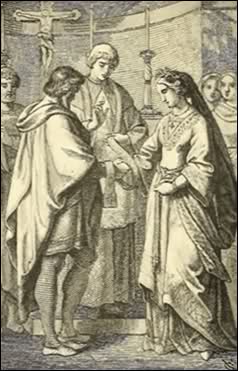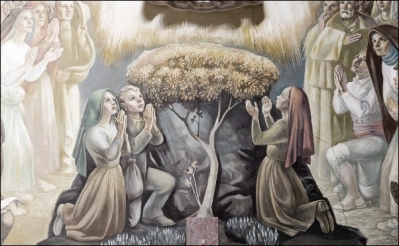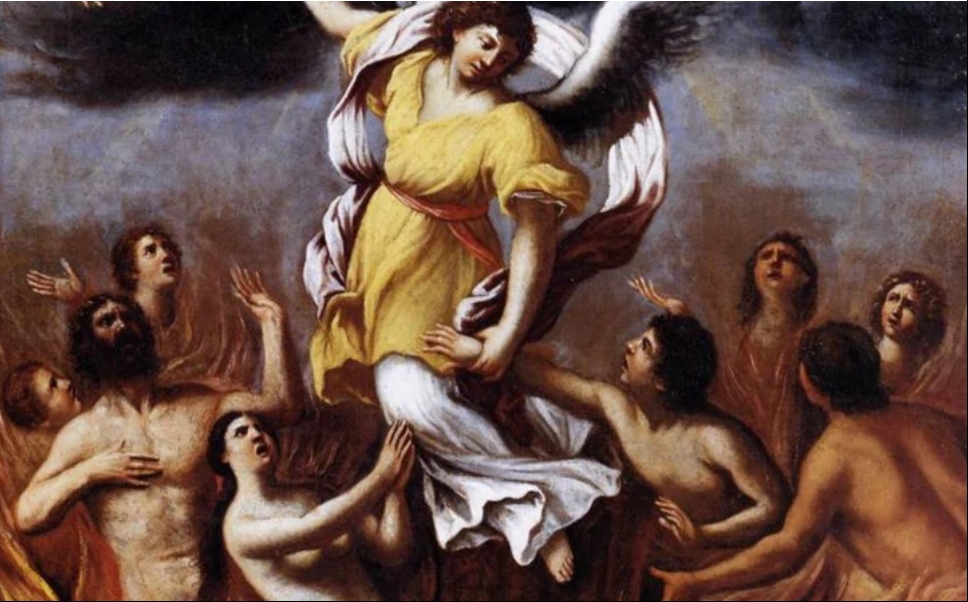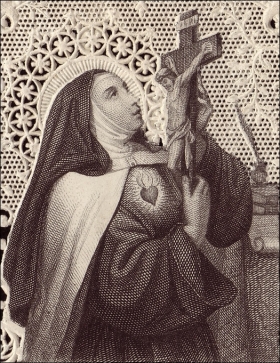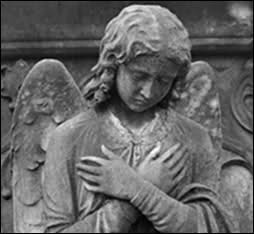O Most Holy Virgin, Mother of our Lord Jesus Christ, Our Lady of La Salette

Pray for priests that they may be imitators of thy son, Our Lord Jesus Christ.
Pray that the Lord may send us many holy priests.
Our Lady of La Salette, restore the Holy Church to all things in Christ.
Thanksgiving

Thine, O Lord, is magnificence, and power, and glory, and victory: and to thee is praise: for all that is in heaven, and in earth, is thine: thine is the kingdom, O Lord, and thou art above all princes.
Thine are riches, and thine is glory, thou hast dominion over all, in thy hand is power and might: in thy hand greatness, and the empire of all things.
Now therefore our God we give thanks to thee, and we praise thy glorious name. 1 Chr:29: 11-13
Advice of St Philip Neri To His Spiritual Children
1. Blessed are you, my children, who have time to do good.
2. Now is not the time for sleep; for Paradise was not made for cowards.
3. Children, keep up a cheerful temper. I will have no scruples or melancholy: only avoid sin.
4. Avoid inordinate mirth, because this roots up the little good which has been acquired.
5. You must not leave your devout exercises; but if you wish to recreate yourselves with a walk, let these be fulfilled, and then go.
6. Do not care to attempt too many devotions; but undertake a few, and persevere in them.
7. You must not look to becoming saints in four days, because perfection is acquired with great labor, and by degrees.
8. Do not have a fancy to be masters of spiritual matters and convert others, but attend to regulating yourself.
9. Children, mortify yourselves in small things, that you may afterwards be able the more easily to mortify yourselves in great things.
10. To choose your vocation, time is required, advice, and prayer.
11. To preserve chastity, it is an excellent prescription to discover your thoughts immediately to your confessor.
12. Do not nourish your body delicately; fly bad companions and evil communication.
13. Avoid idleness, especially during the hours after dinner; because it is at that time that the devil commonly makes his fiercest attacks.
14. Do not touch each other familiarly, not even in jest nor have private conversations with each other.
15. Have no familiarity with women, although they may be allied to you by relationship.
16. Do not trust yourselves whatever may be your experience, but fly every occasion.
17. Go often to confession, at least every eight days; and go to communion according to the advice of your confessor.
18. Be devout to Mary, because this is the best means of obtaining the grace of God.
19. Before choosing a confessor, recommend yourselves in prayer to God; but having once chosen, do not readily change without just cause.
20. When at confession, tell your worst sins first, that the devil may not tempt you to end by hiding them.
21. Take counsel always of your spiritual father, and recommend yourselves to the prayers of all.
22. Give yourselves always, and in all things, into the hands of your superiors; because obedience is a compendious way to acquire perfection.
23. Pray continually to the Lord, that He may grant you the gift of perseverance.
24. Endeavor to have God always before your eyes.
25. Never excuse yourselves when corrected; and keep yourselves from saying any thing in your own praise, even in jest.
26. Read, O my children, the lives of the Saints; hear sermons; and do not fail to practice the prayers and other exercises of the congregation; because they are very pleasing to the Divine majesty.
Children, in order not to fall into sin, keep profoundly engraved in your memories the three warnings given by a holy hermit to certain youths, and act according to them faithfully.
1st Warning. Fly the occasions of sin
2nd Warning. Fly the occasions of sin.
3rd Warning. Fly the occasions of sin.
Fly quickly, fly far, fly always.
Children, do you really desire to be saved! Then ever keep,
First, eternity in mind;
Secondly, God in your heart;
Thirdly, the world under your lee.
“This do and thou shalt live.” ( Lk:10:28)
Gate Of Heaven: Way Of The Child Of Mary
A Manual Of Prayers And Instructions,
Compiled From Approved Sources
For The Use Of Young Persons
(1879)
“Watch Ye, and Pray”
Then Jesus came with them into a country place which is called Gethsemani. And he said to his disciples: Sit you here, till I go yonder and pray.
And taking with him Peter and the two sons of Zebedee, he began to grow sorrowful and to be sad.
Then he saith to them: My soul is sorrowful even unto death. Stay you here and watch with me.
And going a little further, he fell upon his face, praying and saying: My Father, if it be possible, let this chalice pass from me. Nevertheless, not as I will but as thou wilt.
And he cometh to his disciples and findeth them asleep. And he saith to Peter: What? Could you not watch one hour with me?
Watch ye: and pray that ye enter not into temptation. The spirit indeed is willing, but the flesh is weak.
(Mt:26:36-41)
I had been reading the Passion according to St. Matthew, and as I pondered over the sad words, my whole soul went forth in reproaches against the apostles, Peter, James and John; the three beloved of Christ, upon whom He had lavished blessings innumerable, and whom He had loved with a love surpassing any to be found from the foundation to the consummation of the world.
Oh! how I wished that I had been there, to comfort the Man-God in His misery and sorrow I How sweet would it have been to wait, and watch, and pray, with One who was about to lay down His adorable life for the sins of the world. I thought of Him, as, returning in search of human sympathy to the place where He had left the three — He found them sleeping!
Oh! The unutterable agony of that moment! The utter friendlessness of Christ, alone in the gloom and stillness of that awful night! Nature herself was awed; and the stars trembled beneath their covering of inky clouds. But man alone heeded not. In the distance gleamed the lights in the homes of Jerusalem, but in Gethsemane all was dark.
The bush of death was upon the place, and only once was the silence broken, when the sighing wind bore aloft the immortal plea: ”My Father, if it be possible, let this chalice pass away. Nevertheless, not as I will, but as Thou wilt.” And the softly flowing Cedron caught the echo of the prayer, and swept it down the stream of life to the unborn generations of the children of men. Still the three slept!
I feared; and asked myself, how could this have been? Oh, the frailty of the flesh! the base ingratitude—to desert their Creator—to leave Him comfortless in. His affliction—to sleep while He was in agony! Surely I would not have been as these three; of me would it have been written, ‘one was faithful;’
Even while I sat in meditation, sleep overcame me, as it had done unto those whom I had been condemning. The Testament fell unheeded from my hands; and I dreamt. I was in a church, before the high altar of which burnt a brilliant light, the symbol of that Light, the Light of the world, shut within the tabernacle. But where were the worshippers? the watchers? The church was empty! With a start I awoke, the lesson of my vision branded upon my heart.
Never until now had I realized the meaning of those words of Christ: “Watch ye, and pray.” At last I saw their true significance. Not for the three alone had He intended the divine command; not for those few hours of that night long past; but for all upon whom the light of Christianity would shine: and for as long as there was a Christian soul upon this earth.
Was not Christ here in our world, upon our altars, waiting, longing, entreating for acts of love? And I blushed with shame as I thought of the many times I had passed His church without a thought or care for the patient God within. Christians! Catholics! We need not long to have been in Gethsemani to show our love, nor on Golgotha to show our faith. ‘Tis the present which requires our courage. Our everyday life is full of crosses and trials. May we bear them bravely and visit our Lord in the Sacrament of the Blessed Eucharist. We will never blame Peter, James and John for what we have often done, but what with God’s help, we will do no more.
The Rosary Magazine, Volume 26
January-June
1905
Reflections on The Living Rosary
 “Do you never tire of saying your rosary?”
“Do you never tire of saying your rosary?”
“Never. It is such a comfort to me. I am always finding some new beauty in it. The thought came to me today that the rosary is very like our lives.”
“It is divided into three parts: Joyful, Sorrowful and Glorious mysteries. Do they not correspond to youth, maturity and old age? In youth all things are bright and full of promise: here we have the Annunciation, the Visitation and the Nativity. The first foreboding of sorrow may be found in the Presentation—the prophecy of Simeon—and in losing the Holy Child on the return from Jerusalem; yet when He is found in the temple, the joy far outweighs the pain of loss. So it is in youth; trouble is short lived and is quickly forgotten when the cloud has passed away.”
“The Sorrowful mysteries correspond to the years of maturity, when the cares of life press heavily upon us. Who has not knelt in Gethsemane and cried, with our dear Lord: ‘My Father, if it be possible, let this chalice pass from me!’ And how few of us have the grace to add: ‘Nevertheless, not as I will, but as Thou wilt.’ And how often are we scourged. First by our passions, which are so hard to conquer; by ill-health, by disagreeable companions or uncongenial surroundings. We have all to wear the thorny crown of adversity, when our best, our most prayerful efforts fail to stem the tide which has set in against us. Do we not all have a daily cross, whether some great sorrow or an accumulation of petty trifles it matters not. We struggle on more or less bravely and many times fall beneath its weight. Ah! If we but fasten our sins to the cross and offer our hearts to our crucified Saviour, we will not have lived through the Sorrowful mysteries in vain.”
“The last of the three are the Glorious mysteries. They correspond to old age. The soul that has lived down its passions, thrown off its sinful garment and risen above its human frailties, experiences the sublime grandeur of the Resurrection. Once free and untrammeled, the soul can ascend high enough to receive worthily the gifts of the Holy Ghost. Then may our souls, like the body of our Blessed Mother, be ‘assumed into heaven’ and then —“our crown.”
Extract from The Living Rosary
The Rosary Magazine, Volume 26
January-June 1905
Ave Maria, Gratia Plena
“O Amor Mei Nomen Matris Dei”
“Oh name of the Mother of God, thou art my love.”-St. Anselm
We always see the more a man is for God, the more he appreciates and loves the Hail Mary. I do not know how it is, nor why, but nevertheless I well know that it is true; nor have I any better secret of knowing whether a person is for God than to examine if he loves to say the Hail Mary and the Rosary. I say, “if he loves”, for it can happen that a person for some reason may be unable to say the Rosary, but this does not prevent him from loving it and inspiring others to say it.
O predestinate souls! Slaves of Jesus in Mary! Learn that the Hail Mary is the most beautiful of all prayers after the Our Father. , It is the most perfect compliment which you can make to Mary, because it is the compliment which the Most High sent her by an archangel, in order to gain her heart; and it was so powerful over her heart by the secret charms of which it is so full, that in spite of her profound humility, she gave her consent to the Incarnation of the Word. It is by this compliment also that you will infallibly gain her heart, if you say it as you ought.
The Hail Mary well said, that is, with attention, devotion, and modesty, is, according to the Saints, the enemy of the devil, which puts him to flight, and the hammer which crushes him. It is the sanctification of the soul, the joy of Angels, the melody of the predestinate, the canticle of the New Testament, the pleasure of Mary, and the glory of the Most Holy Trinity. The Hail Mary is a heavenly dew which fertilizes the soul. It is the chaste and loving kiss which we give to Mary. It is a vermilion rose which we present to her; a precious pearl we offer her; a chalice of divine ambrosial nectar which we hold to her. All these are comparisons of the Saints.
I pray you urgently, by the love I bear you in Jesus and Mary, not to content yourselves with saying the Little Corona of the Blessed Virgin, but a whole Chaplet; or even, if you have time, the whole Rosary every day. At the moment of your death, you will bless the day and hour in which you have followed my advice. Having thus sown in the benedictions of Jesus and Mary, you will reap eternal benedictions in heaven: qui seminat in benedictionibus, de benedictionibus et metet.
THE TRUE DEVOTION THE BLESSED VIRGIN.
BY THE VENERABLE SERVANT OF GOD,
ST. LOUIS-MARIE DE MONTFORT
1712
In danger, in difficulty, or in doubt, think on Mary, call on Mary. Let her not be away from thy mouth or from thine heart, and that thou mayest not lack the succor of her prayers, turn not aside from the example of her conversation.
If thou follow her, thou wilt never go astray. If thou pray to her, thou wilt never have need to despair. If thou keep her in mind, thou wilt never wander. If she hold thee, thou wilt never fall. If she lead thee, thou wilt never be weary. If she help thee, thou wilt reach home safe at the last—and so thou wilt prove in thyself how meetly it is said: “And the virgin’s name was Mary.” (St Bernard)
Excerpt from The Roman Breviary for the Feast of the Holy Name of The Blessed Virgin Mary
(Sept. 12)
Suffer the Little Children to Come unto Me
All good men love little children. There is something in them that recalls the presence of God, a freshness and innocence which is the mark of His creative hand before sin has marred and almost obliterated it.
Our Lord more than once showed the love of His Sacred Heart for children. When a crowd of women came with their little ones begging Him to bless them, and the disciples tried to push them aside, Jesus interposed: “Suffer the little children to come to Me.” And then He called them one by one and blessed each one, and laid upon each His sacred Hands. What graces must have flowed into the hearts of those favored children! We should pray for all the little ones whom we love, that our Lord may in like manner bless them.
On another occasion, when the children shouted to Him in childish glee: “Blessed is He that comes in the name of the Lord!” the Pharisees begged Him to silence them. But Jesus rebuked the objection almost sternly: “Have you never read, Out of the mouths of infants and sucklings Thou hast perfected praise?” (Mt:21:16) Perfected praise! As if there was something in their innocent voices sweeter to Him than in any others of the mingled crowd.
But Jesus bestowed still higher praise on the sweet simplicity of children. He told His disciples that if they wish to enter the Kingdom of Heaven they must become like little children, docile, obedient, cheerful, submissive, and affectionate. (Mk:10:15)
Beautiful Pearls of Catholic Truth, Containing the Teachings of the Holy Catholic Church
Rev. Bernard O’Reilly
1897
Mary, The Health of The Sick
The sin of our first parents not only deprived man of original justice and of all the gifts consequent thereon; it reduced him furthermore to a state of great weakness, so that it is impossible for us to accomplish works of supernatural value, without a special grace. Fallen man is like one sick, who has no relish for any nourishment whatever. He is deficient in vital energy, and his actions are wanting in that vigor which naturally belongs to a healthy person. He is strongly inclined to vice, and finds the practice of virtue tedious and difficult.
This natural incapacity regarding the performance of good works is further increased by actual sin, whether mortal or venial. The former, by depriving the soul of divine grace, which is the principle of spiritual life, hinders man from doing anything pleasing to God, so as to merit eternal happiness. The latter, by diminishing the fervor of charity, makes the practice of virtue laborious, since charity has for its effect precisely to facilitate the performance of what is good. Sin is therefore a great evil, because, if mortal, it saps altogether the spiritual energy of the soul, and if venial, it notably weakens it. If from individuals we pass on to nations, we perceive that sin, like a subtle poison, eats into the heart of them, weakening and preparing their ruin.
Divine bounty, which for bodily ailments, has procured us efficacious remedies, is not less industrious in providing the means to heal our spiritual maladies. With the sacraments instituted by Jesus Christ to restore our souls to grace or to augment it within us, God has also been pleased to grant us, in Mary’s aid, a potent remedy for our spiritual infirmities. In fact, Mary has not only given us Jesus Christ, the Pastor and Physician of our souls, but furthermore, she watches over us as a tender mother does by the cradle of an ailing child.
Besides this, Mary’s example encourages us in our conflict with the devil. For she is the Immaculate Virgin, who never was defiled by sin. Her sweet soul was always filled with the perfume of the noblest virtues.
Mary never ceases also to hearken to the voice of our supplications and to present them before the throne of God, often anticipating our requests, and obtaining for us, through her own merits and those of Jesus Christ, all the helps necessary to us in our spiritual needs.
And what Mary does for individuals, she also does for whole nations. As a pitiful Queen, she succors them in their distress; she raises them from their bed of sickness, and is for them a bulwark of defense. (Sg:8:10)
Mary’s power and motherly care not only embrace spiritual miseries: they also extend to the ills of the body. How often do we see Mary restoring health to the sick, who have recourse to her with filial confidence!
In Mary’s readiness to alleviate bodily ailments, shines forth most splendidly God’s love for her. It seems as if the Most High had placed no limit to the efficacy of His Mother’s intercession. While other saints are invoked only in particular cases of corporal infirmity, Mary’s power, on the other hand, is exercised over every kind of malady. Hence we may say that, at her word, as once at the word of Jesus, the blind see, the lame walk, the lepers are cleansed, and the deaf hear. (Mt:11:5) The sole difference is that Jesus Christ, being God, wrought these miracles of his own personal authority, while Mary obtains for us, of the Divine Clemency, the graces she asks, by virtue of the efficacy of her intercession with God.
However, though Mary is so powerful in healing all bodily ailments, yet she does not always deliver her clients from every such trial, because God sees best to exercise them in patience, that they may thereby win the reward prepared for them in heaven. But when Mary does not restore bodily health, yet, for all that, she never ceases to act the part of a tender Mother toward us, watching over us, and obtaining for us, in place of bodily strength, resignation to the divine will and interior peace: two sovereign means of sanctification and salvation.
O Mary, Immaculate Virgin, our salvation lies in thy hands. Cleanse our souls, we beseech thee, from the leprosy of sin, and assist us in our corporal infirmities. And if it be the will of God that we must be acquainted with sickness and suffering, obtain for us, at least, perfect patience and resignation in whatsoever God may dispose. Amen.
FLOWER OF PARADISE
-CONSIDERATIONS ON THE LITANY OF THE BLESSED VIRGIN, ENRICHED WITH EXAMPLES DRAWN
FROM THE LIVES OF THE SAINTS
Very Rev. Alexis M. Lepicier, O.S.M.
1922
“Monstra Te Esse Matrem”
Mary made it constantly the business of her life to labour for the end for which God had created her. In her parents’ house, in that of Nazareth, in Bethlehem, in Egypt, upon Calvary, always humble, recollected, modest, pious, she had but one view: the glory and love of her divine Son. Child of Mary, walk in the footsteps of your Mother; appreciate as she did according to their just value, all the perfidious joys and the false enjoyments of the world; seek and desire one thing only: to love God, and to serve Him faithfully all your days.
May Your Immaculate Heart, 0 Mary, be praised, blessed, honored, loved, and imitated, throughout the whole world.
THE CHILD’S MONTH OF MARY
BY AN UNWORTHY CHILD OF MARY.
1851
Mary, The Consoler Of the Afflicted
“Holy Mary, succor the wretched, encourage the faint-hearted, cheer the mournful.” (Antiphon of the “Magnificat” in the First Vespers of the Office of Our Lady.)
Affliction, the inseparable associate of man during his earthly pilgrimage, is the natural consequence of the ills that befall us, either from within or from without. Bereavement, loss of fortune, calumny, malpractices designed against us, are so many causes of exterior affliction. Sickness, temptation, trouble, and, above all, the thought of having offended God by sin, and the danger we run of offending Him again—these and such like things give rise in us to interior sufferings.
Earthly goods are all insufficient to console us in the midst of so many evils. They may assuage our bitterness in part, but when all is said and done, they leave nought but an aching in our hearts, and are powerless to fortify us against fresh miseries.
As an offset against the ills of life, the infinite goodness of God has prepared for us, in the ever present aid of the most Holy Virgin, a copious source of consolation, for which indeed we ought to be grateful. It is enough to have recourse to this Mother of mercy, to be assured of receiving from her a prompt relief in the pains of life, a balm for the wounded heart, a comfort in the woes and calamities which overwhelm us.
Just as Jesus Christ invited us to seek our consolation in Him, when He said: “Come to me, all you that labor and are burdened, and I will refresh you,” (Mt:11:28) thus also Mary holds out to us, in the midst of the sorrows of this life, the most soothing comfort: “Come over to me, all ye that desire me, and be filled with my fruits.” (Eccl:24:26)
Mary’s power to comfort the wretched arises mainly from this, that she above all others has known sorrow. As the inseparable companion of Jesus, during the thirty-three years of His mortal life, Mary partook of all His sufferings. With Him she felt the pinch of poverty, experiencing all manner of privations. The reproaches of them that reproached Jesus fell also upon her; (Ps:69:9) and when the disciples forsook their Divine Master one by one, Mary followed Him faithfully even to Calvary, there to drink with Him to the dregs His bitter chalice.
Even after the Saviour had ended His mortal life of labor and toil, Mary continued to live on and suffer, until it pleased God to call her to Himself.
Mary’s faith and constancy joined with her inviolable attachment to the teachings of her Son are in themselves a source of consolation to us. For, this divine Mother teaches us, by her example, never to despair of divine assistance. She animates us to persevere in our good undertakings, whatever difficulties may oppose us. By obtaining for us, through her mediation, a large share in the virtue of the cross, she changes our sorrows into liveliest joys, as formerly the wood pointed out by God to Moses changed the bitter waters of the desert into sweet. (Ex:15:25)
If we have recourse to Mary in time of affliction, not only shall we receive from her consolation in our pains, but we shall also learn by her example to value at their proper worth the crosses wherewith Our Lord is pleased to visit us.
The time of suffering is by far the most precious time of this life; for it is then that the opportunity comes of practicing the highest virtues. These virtues are: faith in the wise ordering of Divine Providence, trust in the assistance of Heaven, and charity, both toward God, who allows us to be afflicted, and toward our neighbor, who may perhaps be the cause of our sufferings. The time of afflictions is then most precious, though we, alas! oftentimes value it at so low a rate. “If thou also hadst known, and that in this thy day, the things that are to thy peace: but now they are hidden from thy eyes.” (Lk:19:42)
Beware, O my soul, of ever murmuring or losing patience. Bear all things with peace and joy, in company with Jesus Crucified and His sorrowing Mother. Recall to mind these comforting words of Our Saviour: “Blessed are they that mourn, for they shall be comforted.” (Mt:5:5)
O most Holy Virgin, who art fitly called the Consoler of the Afflicted, obtain for me of Jesus Christ thy Son, the grace never to lose heart in the day of trouble, and to seek no comfort but in Jesus and thyself. Grant that I may ever have confidence in thy maternal heart pierced with the sword of sorrow, and that I may find therein my true and only consolation. Amen.
FLOWER OF PARADISE
-CONSIDERATIONS ON THE LITANY OF THE BLESSED VIRGIN, ENRICHED WITH EXAMPLES DRAWN
FROM THE LIVES OF THE SAINTS
Very Rev. Alexis M. Lepicier, O.S.M.
1922
Not My Will but Thine be Done
IMAGO SACRA MILLE GRATIARUM VALET (A holy picture is worth a thousand graces)
Sacramentals are religious objects that the Church gives us to increase our devotion. The two most common sacramentals are the Sign of the Cross and holy water, but the rosary, scapulars, holy cards, and statues are sacramentals, too. Through them, we keep our thoughts on God, thus obtaining grace. Baltimore Catechism No. 2 -Lesson Twenty-Seventh
A Meditation on the Holy Sacrifice of the Mass
Meaning of The Ceremonies At Mass:
1. The priest going to the altar represents Christ going to Mount Olivet.
2. The priest commencing mass represents Christ beginning to pray.
3. The priest saying the Confiteor represents Christ falling down and sweating blood.
4. The priest going up and kissing the altar represents Christ being betrayed by Judas with
a kiss.
5. The priest going to the Epistle side represents Christ being captured^ bound and taken to
Annas.
6. The priest reading the Introit represents Christ being falsely accused by Annas and
blasphemed.
7. The priest going to the middle of the altar and saying the Kyrie Eleison represents Christ
being brought to Caiphas and there three times denied by Peter.
8. The priest saying the Dominus Vobiscum represents Christ looking at Peter and converting him.
9. The priest reading the Epistle represents Christ being brought to Pilate.
10. The priest saying the Munda cor meum represents Christ being taken to -Herod and mocked.
11. The priest reading the Gospel represents Christ being taken to Pilate and again mocked.
12. The priest uncovering the chalice represents Christ being shamefully exposed.
13. The priest offering bread and wine represents Christ being cruelly scourged.
14. The priest covering the chalice represents Christ being crowned with thorns.
15. The priest washing his hands represents Christ being declared innocent by Pilate.
16. The priest saying the Orate Fratres represents Christ being shown by Pilate to the people
with the words Ecce Homo.
17. The priest praying in a low voice represents Christ being mocked and spit upon.
18. The priest saying the Preface and the Sanctus represents Christ being preferred instead of
Barabbas and condemned to crucifixion.
19. The priest making the memento for the living represents Christ carrying the cross to
Mount Calvary.
20. The priest continuing to pray in a low voice represents Christ meeting his mother.
21. The priest blessing the bread and wine represents Christ being nailed to the cross.
22. The priest elevating the host represents Christ being raised on the cross.
23. The priest elevating the chalice represents Christ shedding blood from the five wounds.
24. The priest praying in a low voice represents Christ seeing his afflicted mother at the cross.
25. The priest saying aloud Nobis quoquo peccatoribus represents Christ praying on the cross
for men.
26. The priest saying aloud the Pater Noster represents Christ saying the seven words on the
cross.
27. The priest breaking and separating the host represents Christ giving up his spirit.
28. The priest letting a portion of the host fall into the chalice represents his soul going to
Limbo.
Read More from “The Catholic Church Alone: The One True Church of Christ” by the Catholic Education Company, New York, page 551. The book has been out of print for many decades, but can be read freely on Internet Archive.
Video Credit – The Passion of the Christ by Mel Gibson
FINAL THOUGHTS
Taken from Calvary and the Mass by Fulton J. Sheen
Too many of us end our lives, but few of us see them finished. A sinful life may end, but a sinful life is never a finished life.
Our Lord finished His work, but we have not finished ours. He pointed the way we must follow. He laid down the Cross at the finish, but we must take it up. He finished Redemption in His physical Body, but we have not finished it in His Mystical Body.
He has finished the Sacrifice of Calvary;
we must finish the Mass.
The Father Knoweth
And for raiment why are you solicitous?
Consider the lilies of the field, how they grow: they labour not, neither do they spin.
But I say to you, that not even Solomon in all his glory was arrayed as one of these. – Mt:6:28-29
More beautiful flowers:
Snowflakes- Heaven’s Purity and Grace

The Lord’s ways are in a tempest, and a whirlwind, and clouds are the dust of his feet. -Nahum 1:3
Accustomed to the northern winters of our country and having an admiration for a landscape covered with snow, once I asked myself: What would the reflection of God be expressed in snow? Since I didn’t know where to find an answer, I started to look for it making some simple observations.
What is the snow? We have snow, of course, when a sprinkle begins to fall from the sky in freezing temperatures, and instead of water descending to the earth, the clouds send us a white, light snowfall. Almost everything in the snowfall appears interesting to me.
It seems that when it begins, along with the snowflakes, an atmosphere of silence also falls on the earth. People are generally in their houses, the animals are quiet, and even nature seems to sleep, noiseless and tranquil, as it is covered with a white blanket of snow. This silence is certainly a factor that invites us to recollection, which invites us to think about higher things, the things of God, and our future life close to Him.
The purity symbolized by the snow is also remarkable. When we look upon a thick sheet of snow covering a valley or a mountain, without any dirt or filth in the panorama, the idea of purity seems to naturally come to our minds.
Noteworthy as well is the innocent beauty of the snow. In the countryside we note how even simple roofs, benches, fences, and walls that receive a coating of snow become beautiful. Creeks, lakes, parks, and forests, and the ugliest tree branches with a layer of snow appear handsome and noble. At times they can look like crystal branches of paradisiacal trees, and they invite us to admire God Who placed that exquisite marvel there for an ephemeral moment to be contemplated by men and angels.
What is the value of snow for man? Sometimes it is useful because when it melts, it fills our aquifers and lakes with fresh, much needed water for crops. In the mountains, it melts in the Spring and cascades down, sometimes in the form of waterfalls and sometimes in the meandering creeks, but always providing something beautiful and useful for mankind. Melting snow provides a home for the fish, refreshing drink for wildlife, and fresh water for the plants so they will bloom in the spring.
What do we know about the actual snowflake? A man named Wilson Bentley (1865-1931) from Jericho, Vermont became a famous photographer of snowflakes. He was a farmer in a part of our country where it snowed a great deal and he became fascinated with the snowflake. In the 1800’s, with simple photographic equipment and the natural light of the overcast sky, he photographed over 5,000 snowflakes. Although he had no formal schooling, he worked his farm, researched snowflakes and photographed them, wrote and published 60 articles on weather, the formation of dew, clouds, the effect of frost on cobwebs, and other topics. He also learned to play the piano, clarinet and was even in a local marching band. Here was a man who made good use of his time and talents! We are grateful to him for his work because without it we wouldn’t so easily be able to marvel at the great beauty and variety of the snowflakes. No two have ever been found to be alike.

This is another marvelous thing about the snow, which reflects the grandeur and magnificence of God in the diversity of His Creation. Can you imagine the millions and zillions of snowflakes that fall in just one winter and one place on earth? And no two snowflakes are alike. No mere man, however creative or ingenious, could be a comparable architect of even one snowfall.
When one remembers that God, Who is the author of all creation, has filled our world with His beautiful secrets, then everything becomes an exciting quest. We know with certainty that if we open our eyes to view creation with an eye toward Heaven, what we find will be awe-inspiring. Certainly snowflakes are!
The snow crystals on this page are photographs of real snowflakes. More pictures and information about the unique method used to capture their fleeting beauty can be found at:
SnowCrystals.com.
Jericho Historical Society: http://snowflakebentley.com/
http://www.traditioninaction.org/religious/f010rpSnow_Fitzgerald.htm
Innocence and Imagination
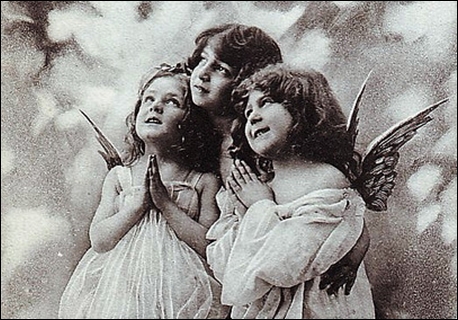
I think there is a line in George Bernard Shaw’s play St Joan in which the inquisitors say with exasperation about Joan’s visions, “Joan, Joan! These visions are all in your imagination!” To which she replies, “But of course! How else would God communicate with me?”
One of the major problems in our society and in our church is that we are suspicious of imagination. There are two forms of imagination. The primary is that part of us–our Soul–which connects us with all that is mysterious and mystical and intuitive and universal. This we might call Imagination with an “I”. The second is derived from the first and is the lower form of imagination–that faculty whereby we envision a solution, dream up a new future, devise the plot to a story, see in our mind’s eye what someone is describing or create something beautiful and amazing in our heads.
Our society and our church is suspicious and uncomfortable with both. Instead we prefer the utilitarian solution. We want facts. We want statistics. We trust engineers and mathematicians and scientists. We want proof. In religion we want certainty. We want dogma. We want rules. We want regulations. Do not misunderstand me. We need all this concrete, solid and “sure” stuff, but without Imagination–without contact with the Spiritual realm and all that is greater than us, transcendent and awesome and wonderful we are left with dull facts.
In religion we are suspicious of Imagination as well. We pull back from the mystical visions of the night. We draw away from the fiery chariot, the earthquake, wind and fire or the still, small voice of Love. We run from the immensity of Imagination–the power of the transcendent and the vast, swirling depths of the ocean of the impossible.
In place of the prophetic vision, the mystical transformation and the trembling ranks of angels we have substituted emotionalism. We mistake the sweet, sentimental comfort song for a real experience of the overwhelming Love of God. We accept the feel good self help sermon as a substitute for the transformation by the tongues of fire–fire that promises to transform only by burning away all the wood, hay and stubble in our lives. We opt for the false comfort of universalism–in which everyone gets to go to Heaven because God (who we have made into a sort of celestial Colonel Sanders) is too nice to send anyone to Hell.
What is required along with a renewal of the Spiritual Imagination is the renewal of Innocence. By this I do not mean naivete, or immaturity, but the sort of child like innocence demanded by the gospel. Along with out distrust of Imagination is a cynicism and skepticism which destroys the soul. The Innocence of which I am speaking is the sort of cheerful innocence which regards miracles as not only possible, but to be expected. This child like innocence sees wonderful connections between things the rationalist would never connect.
Therese (who once played the part of Joan of Arc) as a child once saw the stars in the shape of the letter ‘T’ and exclaimed with delight that her name was written in heaven.
C.S.Lewis once wrote, “The saints, the poets and the children were right.” They had this Innocence and Imagination, and so their hearts were open to Eternity.
http://gkupsidedown.blogspot.com/2011/02/innocence-and-imagination.html























